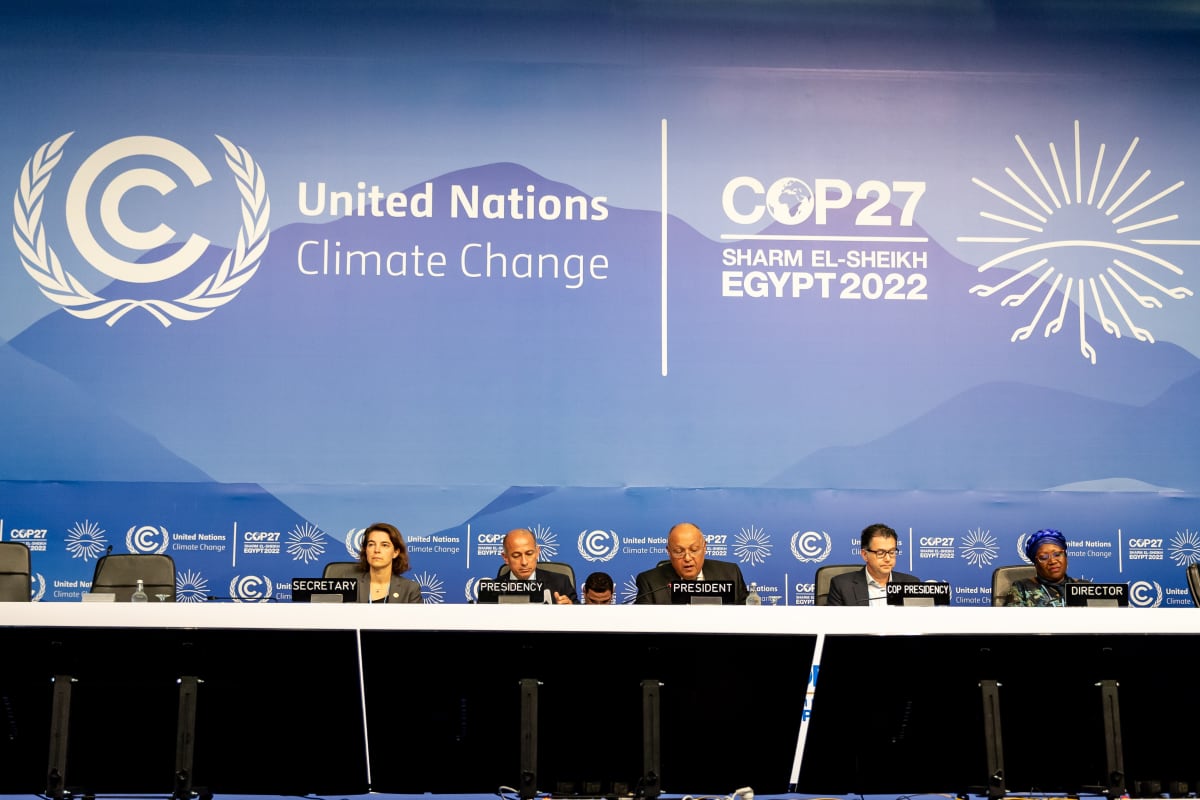Political leaders at the global climate summit are handed an over-long list of unsolved issues to sort this week - and NZ wins Fossil of the Day award
The final week of the COP27 climate negotiations in Egypt got off to a bad start yesterday, with its agenda clogged with some 15 subjects country negotiators had failed to resolve last week. These were passed on to their political leaders to try to resolve this week.
But at this stage of COPs it’s highly unusual for so many topics to be pushed up to climate ministers, a COP veteran told Newsroom yesterday. Two or three was the usual maximum possible to tackle in the final week. Egypt’s relatively passivity in its leadership role in the first week of COP is blamed for the logjam.
Worse, many of the unresolved items come from workstreams seeking to find ways to implement pledges and deals nations had agreed to at past COPs. They range across all core climate subjects such as mitigation, adaptation and climate finance.
Egypt, president of this year’s COP, had made such progress on “implementation” its major theme for the summit. To that end on Sunday, its Foreign Minister Sameh Shoukry, who is chairing COP, held a “stocktaking” plenary session to assess progress.
Tacitly acknowledging the logjam, he said yesterday: “There is still a lot of work ahead of us if we are to achieve meaningful and tangible outcomes of which we can be proud.” He called on countries to resolve the outstanding issues by Wednesday morning.

But that’s highly unrealistic, the COP veteran suggested. COP will have to move on from trying to progress existing pledges to work on high profile new subjects. Finance for climate loss and damage dominates that long list, with the very strong push for it is coming from the Group of 77 developing countries plus China.
Escalating climate catastrophes such as the flooding of one-third of Pakistan’s territory this year, which has cost the country some US$30 billion in economic losses, have made it the “litmus test” of COP27’s success or failure.
Seeking to inject greater urgency into the negotiations, Simon Stiell, the UN’s head of climate, called on countries to use their remaining time in Egypt to “build the bridge needed” to make progress on 1.5C, adaptation, finance, and loss and damage.
Meanwhile, fossil fuel states and companies continue to aggressively pitch their products at COP27, where they have their largest to-date representation at such climate summits.
Saudi minister of state for foreign affairs Adel al-Jubeir said the 2015 Paris Agreement goal to keep global warming to 1.5C was “achievable.” But “we don’t see this as a discussion about fossil fuels,” he told the Financial Times in an interview.
“You can achieve carbon neutrality while producing fossil fuels, and we’re proving it in Saudi Arabia,” he added.
And Vicki Hollub, chief executive of US company Occidental Petroleum, has said consumers must take responsibility for their emissions. Her comments came in a COP27 panel on corporate leadership on net zero goals.
“Everybody that uses a product that was generated from oil and gas has a part in this and is also responsible. Your iPhone, you are responsible for that. If you flew over here, you are responsible for what you used here. The nice clothes you are wearing right now, you are responsible. If we don’t all step up and take accountability, this doesn’t happen.”
“I’ve been to eight COPs and I’ve never seen such a strong presence by the industry that’s the most responsible for this crisis,” David Tong, global industry campaign manager at Oil Change International, told an NGO press conference yesterday.
“But the reality is there is no room for more oil and gas expansion if we are to meet the Paris Agreement goals, the International Energy Agency reported last year…and if we are to protect people and communities around the world.”
Oil Change International has been analysing the emissions impact of announced, near-term new fossil fuel investments, and will release its findings on Wednesday.
Building on the pledge nations made at COP26 in Glasgow to “phase down coal,” COP27 must commit to phasing out all fossil fuels, he said. Tong, who runs his global role in the NGO from Wellington, expanded on this point and others in an interview with Newsroom after the press conference.
*Watch the full interview below*
New Zealand attracted fossil attention of a different kind yesterday. It was awarded the Fossil of the Day Award by the Climate Action Network, a global alliance of climate NGOs.
A traditional feature of COPs, CAN makes the daily award to a country that has taken an anti-climate action. Past winners this COP include the US, Japan, Egypt, the UAE and Russia.
CAN said New Zealand won yesterday’s award “for seeking to delay any agreement to establish a loss and damage finance facility, supporting developed countries proposal to postpone that decision until 2024.”
New Zealand had looked “like a true climate leader” last week, CAN said, when it announced a $20 million contribution to such a proposed fund.
But at COP27 on Saturday evening, New Zealand said:
“Establishing a fund without certainty around what that means would require high levels of confidence that we have a shared understanding of what we are working on, and how. Listening to the interventions, it doesn’t seem like we have this.
“NZ has said previously we think this is urgent. We committed funding this week to underscore that point. But we also think we need to get this right.
“At this COP we have an opportunity to move toward the shared understanding we need by agreeing on a few principles that ensure a fund is as useful as possible.”
That was evidence New Zealand was backing off, CAN said.
“If New Zealand wants to position itself as an ally to the Pacific and other climate-vulnerable nations, it needs to listen to them. Developing countries need a finance facility now.”







